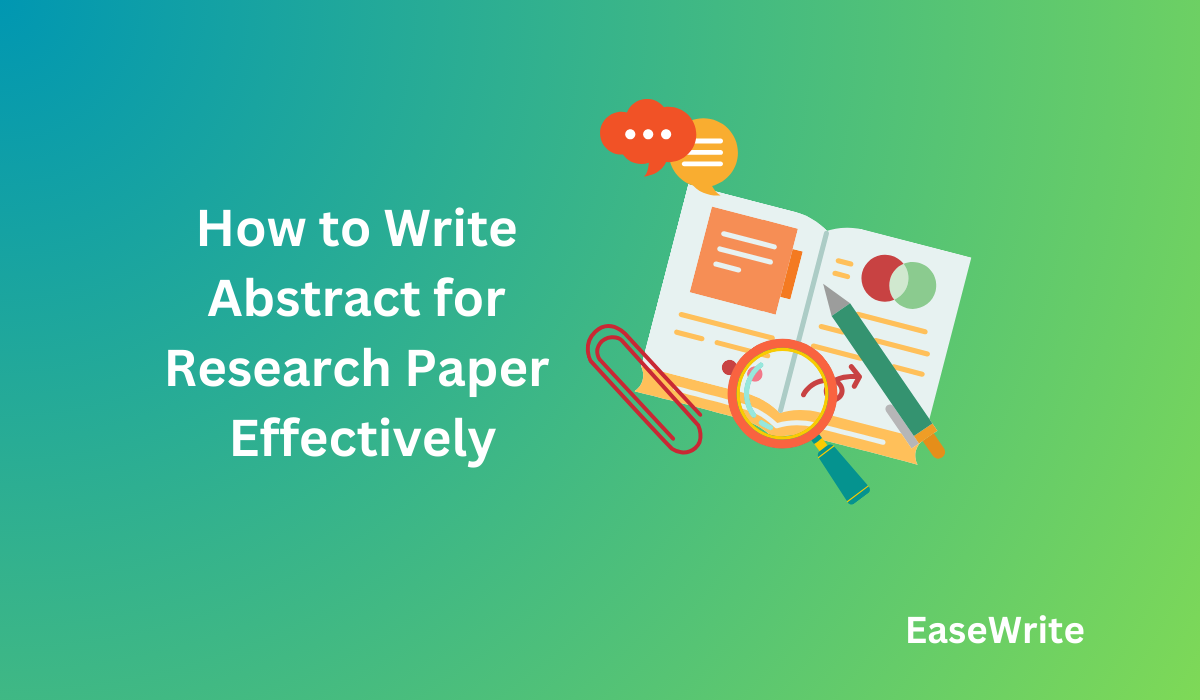Table of Contents
Introduction
The Purpose and Importance of an Abstract
Essential Components of an Effective Abstract
Tips for Writing an Engaging Abstract
Conclusion
Writing an effective abstract for your research is most important task. Abstract represents the significance, findings and contribution of the study in wider field. It gives readers a direction of whether this research piece will serve your purpose or it require further study work.
INTRODUCTION:
In the realm of academic research, an abstract serve as the gateway to your paper, offering a concise summary of its content and enticing readers to delve deeper. However, the art of abstract writing is no kids game—it requires clarity, precision, and strategic use of language. Whether you’re a seasoned scholar or a novice researcher, understanding how to write an effective abstract is crucial for garnering attention and recognition for your work. In this guide, we’ll explore the essential elements of an abstract and provide actionable tips for crafting one that not only captivates your audience but also enhances your paper’s visibility in search engine results through SEO-friendly practices.
THE PURPOSE AND IMPORTANCE OF AN ABSTRACT:
Before diving into the intricacies of abstract writing, it’s essential to grasp its purpose and significance in the research landscape. An abstract is a succinct summary of your research paper, typically ranging from 150 to 300 words, that encapsulates the key elements of your study. Its primary function is to provide readers with a snapshot of your paper’s objectives, methodology, results, and conclusions, enabling them to determine its relevance to their interests and research pursuits.
Moreover, abstracts play a vital role in academic databases and search engine optimization (SEO) by serving as indexing tools that facilitate the discovery of scholarly literature. A well-crafted abstract not only entices readers to explore your paper further but also enhances its visibility in online searches, thereby increasing its impact and reach within the academic community.
ESSENTIAL COMPONENTS OF AN EFFECTIVE ABSTRACT:
To write an abstract that effectively summarizes your research paper, it’s crucial to include the following key components:
Introduction: Begin your abstract by providing context for your study, including a brief overview of the research problem or question you’re addressing.
Objective or Purpose: Clearly state the objectives or purpose of your study, outlining the specific goals you aimed to achieve through your research.
Methodology: Briefly describe the methods or approach you employed in conducting your study, including any relevant research techniques, data collection methods, or analytical procedures.
Results: Summarize the main findings or outcomes of your research, highlighting the most significant discoveries or contributions of your study.
Conclusion: Conclude your abstract by discussing the implications of your findings and their potential significance in advancing knowledge or addressing the research problem.
By incorporating these essential components into your abstract, you can provide readers with a comprehensive overview of your research paper while enticing them to explore its contents further.
TIPS FOR WRITING AN ENGAGING ABSTRACT:
Crafting an abstract that is both engaging and optimized for search engines requires careful attention to language, structure, and content. Here are some actionable tips to help you write an effective and SEO-friendly abstract:
Be Concise and Clear: Aim for brevity while conveying all essential information. Use clear and concise language to ensure that your abstract is accessible to a wide audience.
Use Keywords Strategically: Identify relevant keywords or phrases related to your research topic and incorporate them strategically throughout your abstract. This will not only improve the visibility of your paper in search engine results but also help readers quickly identify the main focus of your study.
Follow a Structured Format: Organize your abstract using a structured format that mirrors the sections of your research paper, such as introduction, methods, results, and conclusion. This will make it easier for readers to navigate and understand your abstract.
Highlight Key Findings: Emphasize the most significant findings or contributions of your study, making them stand out within your abstract. This will capture the reader’s attention and entice them to explore your paper further.
Avoid Technical Jargon: While it’s essential to provide sufficient detail about your research, avoid using excessive technical jargon that may be unfamiliar to your audience. Instead, use plain language to ensure clarity and comprehension.
By implementing these tips, you can create an abstract that not only effectively summarizes your research paper but also maximizes its visibility and impact in online searches.
CONCLUSION:
Writing an effective abstract for your research paper requires careful consideration of its purpose, structure, and language. By including essential components such as the research objectives, methodology, results, and conclusions, you can provide readers with a comprehensive overview of your study while enticing them to explore further. Moreover, by incorporating online practices such as strategic keyword usage, structured formatting, and key word optimization, you can enhance the visibility and accessibility of your abstract in online searches. Ultimately, mastering the art of abstract writing is essential for researchers seeking to disseminate their findings effectively and attract attention to their work in the competitive landscape of academic publishing. With practice and attention to detail, you can craft abstracts that not only resonate with your audience but also elevate the impact and reach of your research within the scholarly community and beyond.
